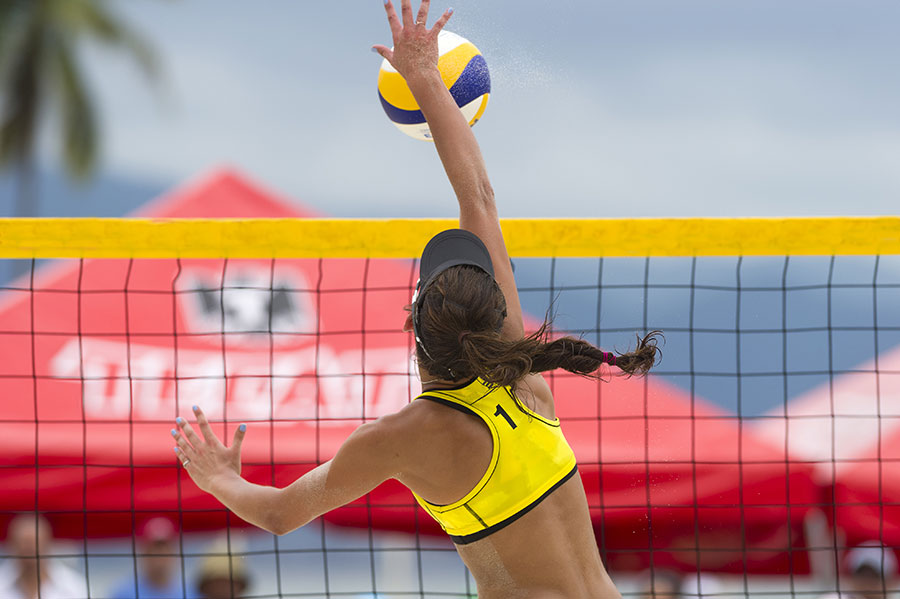Nutrition for Volleyball Players
The game of Volleyball is played internationally by people of all ages, across all skill levels, from recreational to elite. It is played indoors, outdoors, and often at the beach. Volleyball is an Olympic sport for both males and females which results in added global popularity. Volleyball requires skill, accuracy, and strength. Apart from height, which is an advantage on the court, having reduced body-fat levels and positive power-to-weight ratio can help increase and maintain speed and agility. Healthy eating habit off the court provides much nutritional support for a fit, fast and lean volleyball player.
As experts will tell you, a healthy and balanced diet is very much a requisite for success in volleyball — just as much as skills and fitness through training. It becomes very important for every player to be well-informed about how they can improve their performance through proper diet and hydration.
Hydration needs
Adequate hydration is vital to volleyball players, as with any other performance team sport. Although volleyball is usually played indoors, in a controlled environment, the physical demands and intensity of training sessions and matches cause players to lose significant amounts of body fluids during games.
To remain well hydrated it is necessary to drink fluids throughout the day, well before feeling thirsty. Shortly before training or competition begins, it is advisable to have a moderate amount of fluid to help with pre-game hydration and to also help prime the digestive system to absorb fluids during the event.
Staying hydrated is especially vital for longer games and in hot weather. Players should also immediately replenish fluid deficits accrued during training or a match. Taking water is usually the best option, although a sports drink may be more beneficial for replacing electrolytes if playing for longer than 1 hour. Ultimately, the prevalent environmental conditions and individual sweat losses are the main determinants of fluid needs.

On average, a player should consume 20 ounces of fluid 60 minutes before practice, workout or match, and should take in an additional 5-10 ounces of fluid every 15-20 minutes during the exercise session.
You can also weigh yourself to track fluid loss. Consume 24 ounces of fluid after exercise for every pound you lose during exercise. Your daily fluid intake should be about 90 ounces (that’s 11 cups or 4.5 water bottles). This applies to all healthy fluids.
Pre, During and Post Game diet requirements and examples
To achieve excellence in the sport of Volleyball, a healthy eating pattern off the court is an excellent complement to focused and consistent skills and conditioning training. Same holds true for match days.
Daily nutrition for a player should contain nutrient-rich complex carbohydrates, such as whole grain bread, brown rice, quinoa, and whole wheat pasta. Lean protein sources like lean red meat, poultry, seafood, eggs, dairy, and lentils should also be incorporated as well as healthy fat sources like avocado, olive oil, nuts, and fish. Fruits and vegetables should not be left out.
When preparing for a match, a meal or snack should be consumed within 2-4 hours prior to the start of the game. Players need to exercise caution when making food and fluid choices to avoid unexpected problems such as an upset stomach.
Depending on the time of day and individual preferences, some ideas of carbohydrate-rich meals to eat before a match include:
Creamed rice and a piece of fruit
Sushi or rice paper rolls but avoid fried fillings
Porridge with milk, maple syrup, and a banana
Sandwich with meat/chicken/cheese or nut butter
Cup of yogurt with fruit salad
Vegemite and cheese sandwich or wrap
Toast or English muffin with avocado
Pasta with tomato based sauce
For players who find it difficult eating solid foods close to the start of a match, they could try replacing meals with liquid carbohydrates. These include sports drinks, juice or protein-enhanced drinks.
During a game lasting less than 1 hour, water or electrolyte drinks should be taken frequently. For longer games, sports drinks may be used as a source of carbohydrate and as a fluid. Alternatively, carbohydrate-rich, easy-to-digest snacks such as fruit, cereal bars or sports bars can help replenish muscle glycogen stores (fuel).
After every training session or match, recovery is vital and is accelerated by consuming the right meal or snack. Such a diet should contain carbohydrate to replace muscle glycogen stores as well as protein for muscle repair, in addition to fluids to make up for sweat losses.
In situations where several games are played in close succession, a recovery meal or snack should be consumed within 30-60 minutes of finishing matches. This will enable a player to maintain optimal performance right through to the end of the tournament.
A full course meal rich in carbohydrate, protein, and vegetables will provide the necessary components for a player’s recovery after a match or a day of tournaments.
The following are some ideas for recovery snacks and meals:
Yogurt with fruit and added nuts
Milkshake, Fruit Smoothie or Sustagen Sport
Sports Bars which combine protein and carbs
Chocolate/flavored milk
Grainy sandwich with meat, fish or cheese
And then to complete recovery, some suitable meals include:
Grilled salmon with baked potatoes and vegetables
Homemade pizzas with ham, cheese, and vegetables
Chicken and vegetable risotto
Volleyball nutrition best practices
Nutrition best practices in volleyball involve developing a nutrition strategy that maximizes a volleyball players’ performance. A balanced and consistent core eating and hydration plan are essential for the sport of Volleyball. Players should also have the right attitude toward nutrition and apply sound nutrition practice before, during and after each game.
One of the foremost experts in the game is Dr. Kristine Clark, who is the director of sports nutrition for the Penn State women’s volleyball team – winners of the 2013 NCAA championship.
Dr. Clark is a registered dietician who works directly with the players on their dietary and fitness plans. She has outlined five ways to maintain professional practices in sports nutrition. These include:
- Eat immediately after waking up in the morning
Start with your breakfast. Clark advises not to skip breakfast as it helps you create a base for building your energy stores back up to where they were the day before. “Skipping breakfast puts you in a serious deficit and you can’t catch up,” Clark says. “If athletes go to practice at 3 o’clock – even though they’ve had lunch – they are falsely operating on the idea that their energy levels are high. Their energy levels are actually very low (when they skip breakfast).”
- Drink before you are thirsty
She recommends drinking 32 ounces of water before noon every day and 32 ounces of water before practice. As a result, Penn State athletes carry a 32-ounce water bottle with them at all times to keep track of their water intake.
- Timing is everything
It is also important for a player to eat at the right time.“You’ve got to look at your day as if it matters that calories are available to you,” she says. “You have to eat before a workout. You have to. You’ll get more out of the workout because you’ll have available energy.”
- Eat a balance of carbs and proteins after your workout
“We want players to be eating a meal within an hour after exercise,” Clark says. “If that can’t happen, then a snack is appropriate until they can eat a meal. And the snack needs protein. This is where protein is most important for athletes. Fifty percent of what they eat should be protein, and 50 percent of what they eat should be carbohydrate.”
- Eating throughout the day
Clark makes a case for players to eat every two to three hours daily.
Example diets from volleyball celebrities
Few names are as renowned as superstar Kerri Walsh Jennings when it comes to the game of volleyball. Together with her teammate Misty May-Treanor, they won gold medals in three consecutive Olympic games; at the 2004, 2008 and 2012 Olympics. And after Treanor retired in 2016, Jennings won bronze in the 2016 Rio Olympics, becoming the most decorated beach volleyball Olympian of all times. For Jennings, nutrition has played a very important part in her career.





